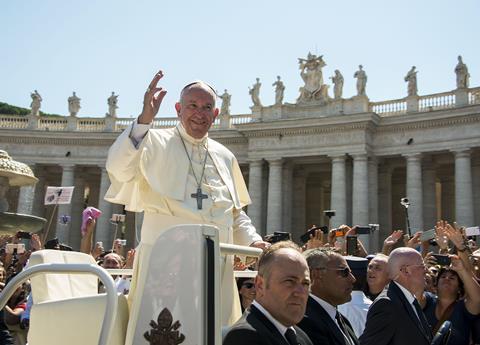Writer Shannon Cramer writes an open letter on her journey with surrogacy, and explains why she believes it is a blessing from God.

Dear Pope Francis,
On Monday 8 January, you called for a global ban on surrogacy. I applaud the Catholic church for championing the welfare of financially vulnerable women and for protecting embryo life. Surrogacy can have a lot to answer for when it becomes a big business that treats human participants as commercial transactions.
But if done with care, I believe gestational surrogacy can embody the best of the human spirit and bring glory to God. My husband, Parker, and I are Christians and hoping to be parents through surrogacy. This is our story.
I believe gestational surrogacy can embody the best of the human spirit and bring glory to God
Parker and I married in 2010 dreaming of four children. A year later, I developed three autoimmune conditions. I spent a decade improving my health so that I could be a good mum, but pregnancy was still unsafe. So we began to consider adoption.
Families who adopt are superheroes. As a part-time preschool teacher, I know I would love any child regardless of their genetic relationship to me. But the reality is not so simple. In the US, birth mothers have the opportunity to choose parents for their child based on profiles about adoptive couples. This can put people with health conditions at a disadvantage. I spent months asking God to change my fearful heart. Could Parker and I wait years to be chosen, knowing we were more likely to be passed over to due to my disorders?
Instead, God’s peace found us around a surprising corner—gestational surrogacy. IVF had never seriously been on our radar because we did not want to have unused embryos. But Parker found a clinic that respects our religious beliefs. We talked with other Christian families who honored life by going back for each viable embryo. Our solution was different. In order to protect our future children, we froze my nineteen eggs separately from Parker’s sperm.
The lab fertilized the eggs one at a time. After the first five fertilizations failed, we prayerfully fertilized a batch of three eggs—believing that God saw our desire to preserve life. This time two beautiful embryos formed. We trust that either both embryos will be needed for our surrogacy journey or that God will create a way for us to return for the second one.
Our next step was to find an independent carrier match because the agency cost is outrageous. We could offer a semi-compassionate surrogacy—enough money to say “thank you” for nine months of inconvenience and discomfort—but not enough to tempt individuals who only want a paycheck.
It is astounding that anti-rejection medications are not needed in the surrogacy process. In God’s design of the human body, a woman is able to receive an egg that does not belong to her
Our state protects surrogacy with extremely strict guidelines. (Several of our friends failed to qualify due to minor technicalities.) Both potential carriers and intended parents are required to have background checks, proof of financial wellness, extensive medical exams (including spotless pregnancy and postpartum records for carrier candidates), separate and joint counseling sessions, and independent legal representation. Additionally, we were determined to find a married Christian carrier who was interested in having a lifelong relationship with our child.
I was sceptical that we could create a familial bond with a stranger until we met Stephanie, and her husband, Brad, on a Facebook surrogacy group.
I wish everyone embodied Christianity like this couple. Their family thrives on a philosophy of extraordinary love. Stephanie and Brad want to teach their five children, “With just a little extra effort, you can do something life-changing for another person.” Brad has donated a kidney. They have been foster parents. And when Stephanie saw friends heartbroken by infertility, a desire bloomed in her heart to give another couple the ultimate gift.
Her selfless motivation is a type of living organ donation. The Catholic church approves of receiving transplants and applauds organ donation as a sacrificial act. However, transplant recipients must take medications for the rest of their lives to prevent their bodies from rejecting cells perceived as foreign. Our bodies are not designed for such procedures. Yet, we celebrate transplants as good—and are right to do so—because they preserve life.
Read more on fertility and childbirth
‘I don’t want IVF; I don’t want to help God’
Fertility leave may help couples who are struggling to conceive
It is astounding that anti-rejection medications are not needed in the surrogacy process. In God’s design of the human body, a woman is able to receive an egg that does not belong to her. Her body does not attack this foreign cell. Instead, it welcomes the egg and gives it a home. Perhaps God has left this door open so that women like me can experience the joys of motherhood when courageous women like Stephanie step into the breach to carry what we cannot carry ourselves.
Our partnership is anything but a cold transaction. Two families are intentionally joining together to heal great brokenness with a sacrificial love that is bringing long-awaited life. I have never had another person so vividly remind me of Jesus.
Pope Francis, my child is not a science experiment. He or she is a miracle that has only been made possible by God’s most extraordinary love.
With deepest respect,
Shannon Cramer

































